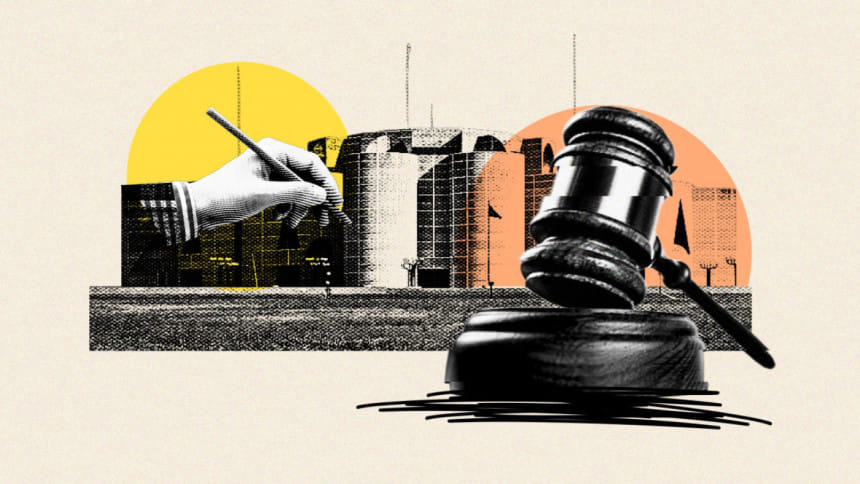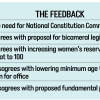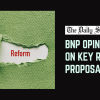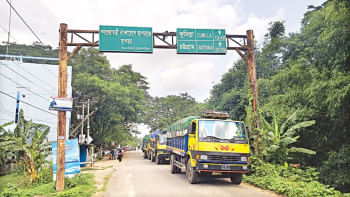Consensus commission: Critical issues picked for party feedback

To seek political parties' opinions, the National Consensus Commission has picked the "most crucial" proposals from a wide range of recommendations made by the reform commissions.
The parties will be able to give opinions on entire reports of the reform commissions, but their answers to questions from the Consensus Commission will steer the direction of the talks to be held afterwards.
"We definitely want to know their opinions on these matters to ensure the discussions proceed smoothly," Prof Ali Riaz, vice-chairman of the Consensus Commission, told The Daily Star yesterday.
Badiul Alam Majumdar, a member of the Consensus Commission, said the questions are on the important proposals and the political parties naturally have their opinions on these issues.
"The perspectives of the political parties are crucial. We hope they will provide their responses," he added.
The Consensus Commission, headed by Chief Adviser Prof Muhammad Yunus, sent the multiple choice questions on each kind of reform in letters to the political parties last week.
The constitutional reform portion alone has more than 70 questions, while from the Electoral Reform Commission's proposals, at least two dozen questions were made, commission members said.
The Consensus Commission is likely to sit with the political parties separately from mid-March after getting their responses. They have been asked to give their feedback by March 13.
After the fall of the Awami League regime in August last year, the interim government formed six reform commissions on the constitution, electoral system, public administration, police, Anti-Corruption Commission, and the judiciary in October.
They submitted their final reports in February. Subsequently, the government formed the National Consensus Commission. It will come up with a charter based on the reform proposals that will gain political consensus.
For the answers to the questions on the reform proposals, the parties have been given three options: "Agree", "Disagree", and "Partially Agree". Each party must select one of these options to express their stance.
The second aspect of the answer section is their opinion on the timeline and method of implementation of each recommendation.
There are six options to choose from: implementation through an ordinance before election, implementation through a referendum before election, implementation through a referendum during the election, implementation through a constituent assembly, implementation through constitutional reform after election, or implementation through both a constituent assembly and a legislature.
Additionally, a comment section has been provided next to each recommendation for the parties to express their views.
Asked about why implementation through a constituent assembly was in the option, Prof Ali Riaz said, "There is ongoing discussion in the political arena regarding the constituent assembly issue, so we added an option in the questions."
THE QUESTIONS
From the Constitution Reform Commission's proposals, the Consensus Commission chose the recommendation on making equality, human dignity, social justice, pluralism and democracy as fundamental principles of the state.
It also seeks answers on scrapping of articles 7A and 7B of the constitution. Article 7A says a person shall be guilty of sedition for abrogating, repealing, or suspending the constitution or any provisions by any unconstitutional means. Article 7B has made some unspecified "basic structures" and a large number of articles "unamendable".
The commission sought opinions on the proposals to revoke articles 8, 9, 10, and 12, which deal with the issue of nationalism, socialism, democracy, and secularism, the current four fundamental principles of the constitution.
The parties' opinions were sought on proposed changes to the Bangla name of the state, calling the citizens "Bangladeshis" instead of the previous "Bangalees", and expansion of the fundamental rights to include food, clothing, shelter, education, internet, and vote.
The introduction of a National Constitution Council, the formation of caretaker government, a bicameral parliament, proportionate representation system to the upper house, lowering age limit of MPs to 21, keeping at least 10 percent candidates in the lower house from among the youth, and constitutional amendments with two-thirds majority in both houses are among the topics in the questions.
The commission asked for the parties' opinions on limiting the terms of the president and the prime minister, and prohibiting the same person from simultaneously holding the positions of party chief, prime minister, and leader of parliament.
It wants the parties' views on the constitution of the Election Commission, a separate authority for demarcation of constituencies, making a bachelor's degree mandatory to become a member of the upper house in the proposed bicameral legislature, barring individuals from contesting polls if charges are accepted by the International Crimes Tribunal, establishing a permanent national constitutional council for appointing officials in all constitutional bodies and others.
The political parties will need to give feedback on Public Administration Reform Commission's proposals on transforming four oldest divisions into four provinces and introducing a provincial governance system, the formation of an independent and permanent Public Administration Reform Commission, amendments to the Official Secrets Act of 1923, and creation of two new divisions named Cumilla and Faridpur.
The other proposals in the letter with questions include having new commissions named Public Service Commission (Education), Public Service Commission (Health), establishing a Capital City Government at the proposed provincial government level, comprising Dhaka Metropolitan, Tongi, Keraniganj, Savar, and Narayanganj.

 For all latest news, follow The Daily Star's Google News channel.
For all latest news, follow The Daily Star's Google News channel. 








Comments